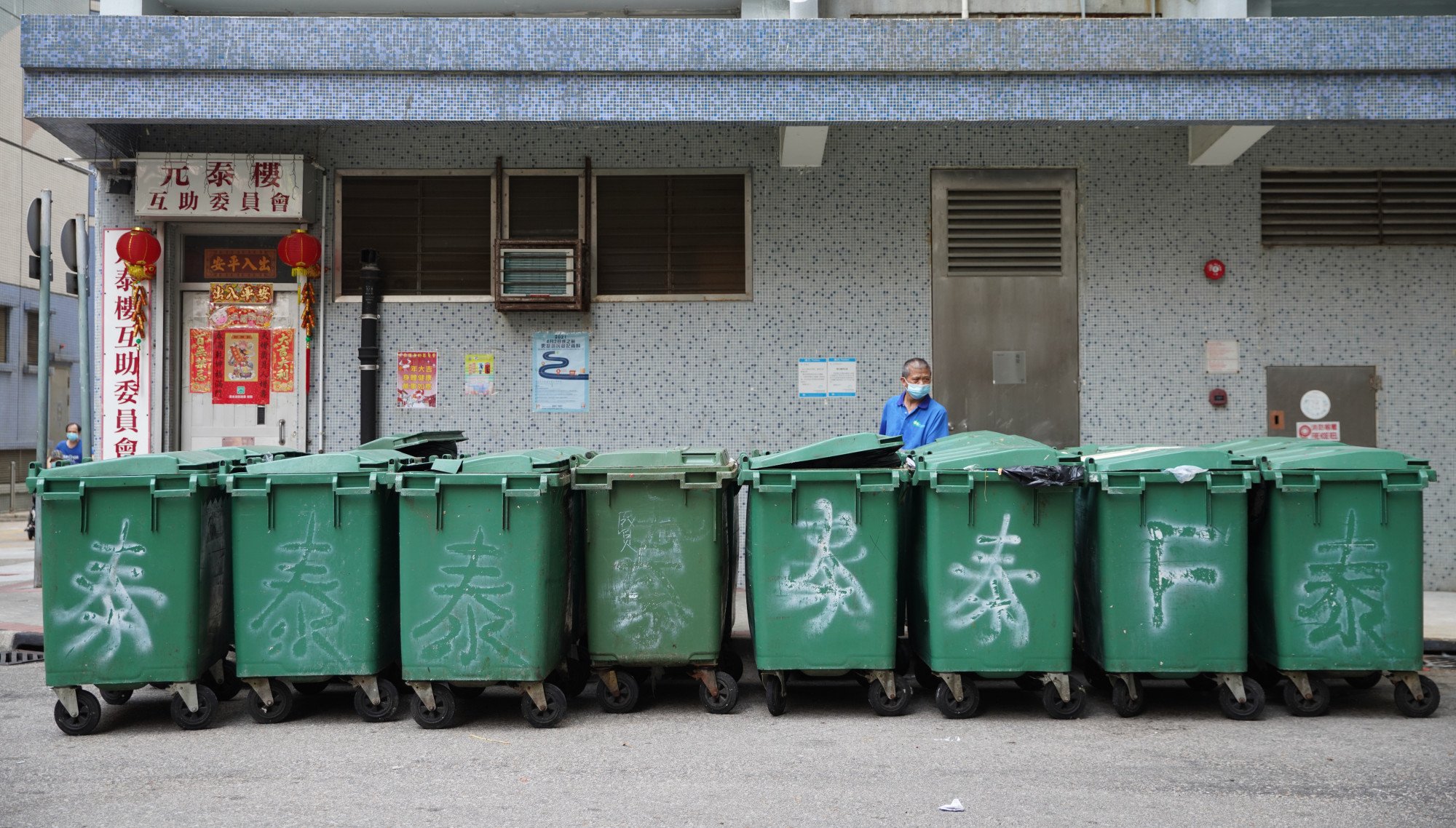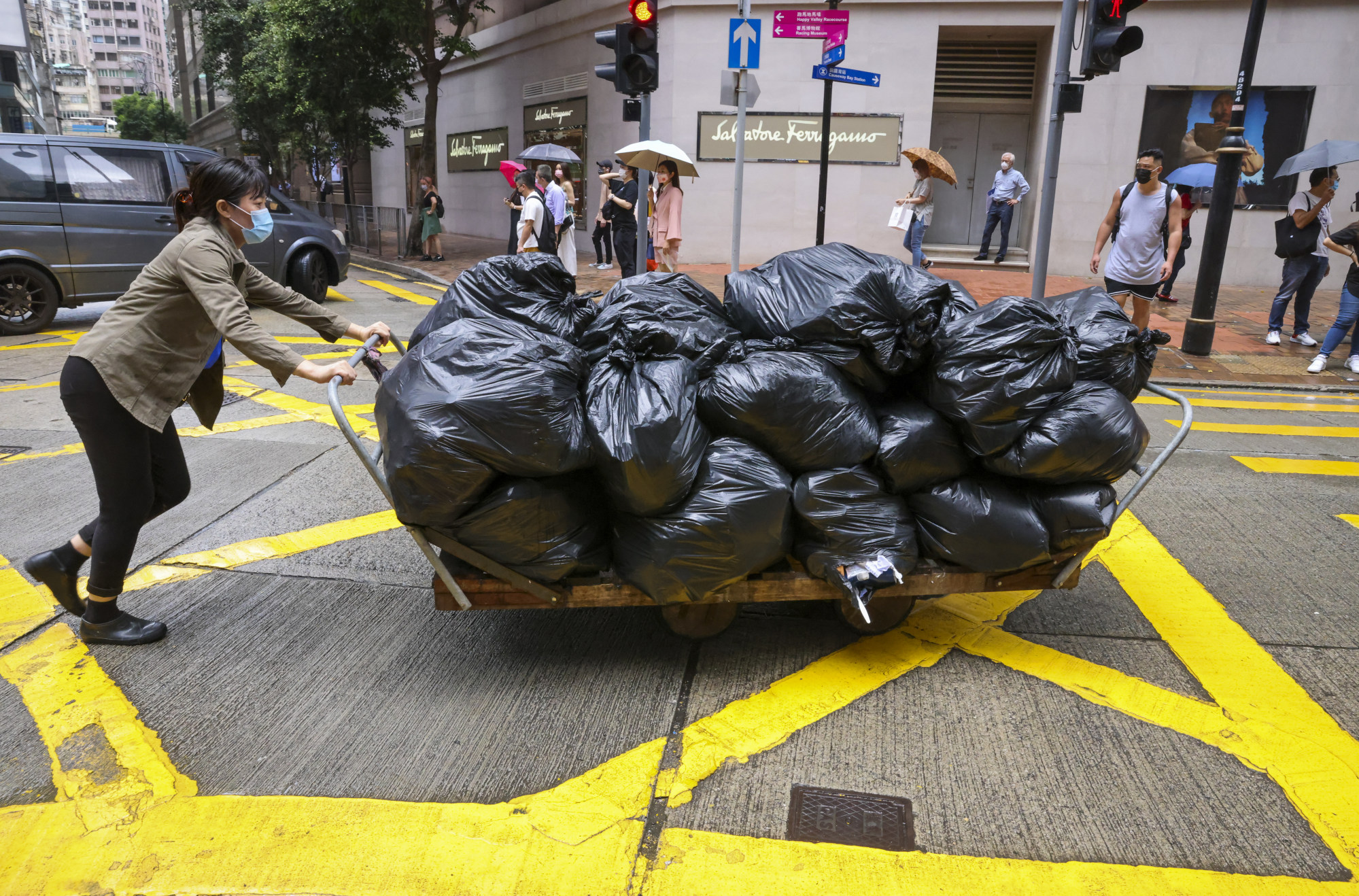
Hong Kong’s new waste charging scheme has loopholes, environmentalists and cleaning industry warns
- Some households in residential blocks with garbage chutes may simply decide not to put waste in government-designated bags, they warn
- Workers will have no idea which households failed to use mandatory bags and bear responsibility for ensuring all waste is properly packed up for collection, they say
Guidelines for Hong Kong’s new waste charging scheme will open up loopholes and allow households to dodge the levy or leave law-abiding residents paying twice the charge, according to environmentalists and cleaning industry representatives.
Greeners Action and industry insiders argued that the Environmental Protection Department’s best practice guidelines would defeat the scheme’s polluter-pays principle, as some households in residential blocks with garbage chutes could simply decide not to put their waste in the government-designated bags.
Environment authorities in July announced the long-awaited scheme would take effect on April 1 next year after nearly two decades since first being floated.

The scheme sits at the centre of the city’s overall waste reduction strategy, creating financial deterrents for generating excessive household rubbish.
Residents must buy government-designated plastic bags in any of nine available sizes, with each litre costing 11 HK cents (1.4 US cents). There will also be a six-month grace period after the scheme begins.
Earlier this year, the Environmental Protection Department released its best practice guidelines for sectors including catering, hotel and shopping centre operators.
The suggestions for property managers state that two additional bag sizes – 240 litres (63 gallons) and 660 litres – will be available for frontline cleansing workers at residential estates with garbage chutes to temporarily store the rubbish before shipping it for further processing.
Hong Kong’s long-awaited plan to charge residents for waste delayed to next year
“The guideline requires residents to wrap their garbage in designated bags before discarding it,” Greeners Action’s senior public affairs officer Beatrice Siu Wing-yin said. “But because the compression system in the refuse chutes will crush all the collected waste, there is no way the cleaners can identify the improperly packed waste.
“This is also unfair to those who have bought the designated bags.”
According to the guidelines, frontline workers are responsible for ensuring all the waste is properly packed inside the authorised bags before sending it to garbage trucks and refuse collection points. Otherwise, they could be found in breach of the rules.
The guidelines also state that statutory defences will only be allowed when the worker has taken all “reasonable precautions” and exercised “all due diligence” in avoiding committing an offence.
Siu warned that cleaners would be forced into opposition with residents when trying to refuse improperly packed rubbish.
Hong Kong ‘should delay waste-charging scheme until spring to prevent build-up’
Raymond Yau Pui-lam, spokesman of the Environmental Services Contractors Alliance, said authorities began offering seminars on the scheme to cleaning service providers and logistics companies this month.
But stakeholders still had their doubts, he said.
“Those talks weren’t down-to-earth at all,” he said. “The officials and scholars only talked about the law, not practical operations.”
Yau added the 240-litre and 660-litre bags, which he said he proposed to the government earlier, were intended to be used by industrial and commercial buildings but not property management of residential blocks.
He also warned that putting the bags in refuse chutes might eventually lead to double-charging of residents who followed the rules, as the managers passed the extra cost on to them in the form of management fees.
Joe Wong Nai-yuen, the chairman of the Cleaning Service Industry Workers Union, said many property managers tended to use the large designated bags to avoid falling afoul of the new law as frontline workers were responsible for any improperly packed waste.
“The guide fails to alleviate the workers’ concerns,” he said. “The practice is difficult to execute.”
Wong added he had seen some tenders for cleaning services asking contractors to adsorb all extra costs arising from the new scheme.
“Some workers just said they would resign before April,” he said.

Both Yau and Wong suggested authorities make use of the six-month grace period to plug the loopholes and solve the operational challenges. The government should use data on the scheme obtained during the first six months to see whether the current punishment was sufficient, Yau said.
Anyone who fails to use a designated garbage bag will be issued a HK$1,500 (US$192) fixed-penalty ticket. Serious offences can lead to a HK$25,000 fine and a six months’ jail, with subsequent breaches resulting in a HK$50,000 fine and six months in prison.
Waste-charging scheme will take effect by year-end: Hong Kong’s environment chief
Greeners Action called on the government to set up a reporting mechanism on litterbugs and rule-breakers, deploy more officers for spot checks and provide frontline workers with a greater leeway for defending themselves if they faced penalties.
The department said its guidelines only offered broad suggestions and that stakeholders should adjust arrangements based on the conditions of their premises or industry.
“We expect that some cases of illegal garbage disposal may occur in the early stages of the implementation of garbage charging,” a spokeswoman said. “Owners’ corporations and property management companies should strengthen education and publicity and organise different environmental protection activities to reduce breaches and increase residents’ awareness.”
